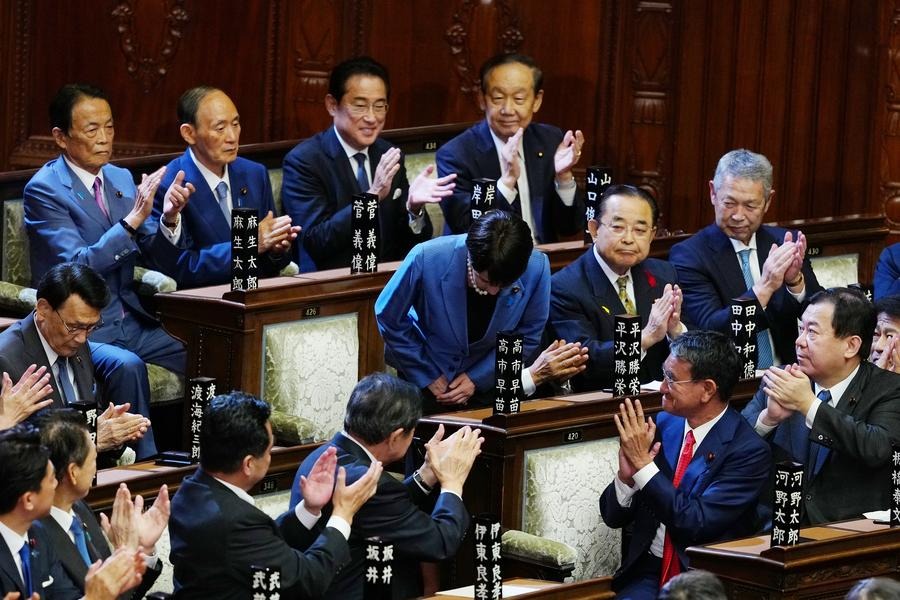Common ground


By strengthening communication and coordination on environmental issues, China and Germany can become "green partners"
At the invitation of German Chancellor Olaf Scholz, who visited China in November 2022, Chinese Premier Li Qiang paid an official visit to Germany and co-chaired the seventh China-Germany inter-governmental consultation from June 18 to 21. It is the first face-to-face consultation between the two countries since the outbreak of the COVID-19 pandemic and the first comprehensive engagement between the newly formed governments of the two countries, which is of great significance to advancing China-Germany pragmatic cooperation in various fields. Against the background of unprecedented changes in a century and Germany's zeitenwende (historical turning point), the fact that Germany was the first stop on Chinese Premier Li Qiang's first overseas visit after taking office reflects China's expectation of strengthened China-Germany cooperation and development. On July 13, Germany presented its first and long-awaited China strategy. The 64-page document outlines Germany's new policy toward China.
From the perspective of pragmatic cooperation, the Chinese and German economies are highly complementary. A report from Germany's Federal Statistical Office, Destatis, shows that, according to preliminary results, goods worth 298.9 billion euros ($327.57 billion) were traded between Germany and China in 2022 (exports and imports), once again making China the largest goods trade partner of Germany. China has now been Germany's largest trading partner for seven consecutive years and Germany the largest trading partner of China in Europe for 48 years in a row.
In terms of raw material supplies, according to data from the European Commission, the European Union faces a high concentration of sources for certain critical raw materials. China is a main supplier of critical raw materials to the EU.
Chinese and German companies have great potential for cooperation in many areas. According to Germany's Der Spiegel magazine, the daily Sino-German trade volume has reached nearly 1 billion euros and thousands of European companies have set up subsidiaries or factories in China.
For instance, German companies such as BASF, Volkswagen and Mercedes-Benz attach great importance to the Chinese market and are dependent on their profits in China. A large number of German companies such as Siemens attended the Semicon China 2023 held in Shanghai from June 29 to July 1. In terms of specific areas of economic and trade ties, China is an important supplier of solar panels to Germany. According to an International Energy Agency report published in July 2022, China accounts for more than three-quarters of the global solar panel production.
It's worth noting that both China and Germany have a strong desire to press ahead with bilateral pragmatic cooperation in combating climate change. As stressed in Germany's China Strategy document, China remains an indispensable partner in tackling global challenges such as climate change and pandemics. Since December 2020, Chinese and German experts have been carrying out exchanges and dialogue under the framework of the Sino-German Track II Dialogue on Climate Change and Sustainable Development organized by the National Center for Climate Change Strategy and International Cooperation in China and the German Environment Agency.
Bilateral cooperation is also gaining new ground. A day prior to the seventh China-Germany inter-governmental consultation, China's Minister of Ecology and Environment Huang Runqiu and German Federal Environment Minister Steffi Lemke held talks and signed a joint declaration regarding cooperation on the environment, climate change and sustainable development.
In the coming years, the two countries should seize the opportunity of the green transition and promote the upgrading of bilateral cooperation. China proposes that China and Germany become "green partners", strengthen communication and coordination on green and environmental issues, promote green energy technology development and industrial technology upgrading, and deepen cooperation in such fields as new energy vehicles, green finance and third-party markets.
The two sides have reached a consensus that China and Germany will deepen cooperation on a higher level, with higher standards and higher quality, and jointly maintain the stability of the global production and supply chains. They have also agreed to set up a dialogue and cooperation mechanism on climate change and the green transition, hold the third China-Germany High-Level Financial Dialogue as well as new meetings of China-Germany Environment Forum and health dialogue, and continue to deepen cooperation in such fields as the economy and trade, investment, automobile manufacturing, high technology, renewable energy, the digital economy, and people-to-people and cultural exchanges.
Despite the substantial progress in bilateral pragmatic cooperation, the word "de-risking" has frequently appeared in German media reports and the official documents of Germany and the EU. In the Strategy on China, Germany emphasized its heavy economic dependency on China in some areas and proposed measures to increase diversification to "de-risk".This shows that Germany and the EU are hesitant over how to further develop relations with China — they do not want to decouple from China, but wish to reduce their economic dependency on China in certain fields.
German's Strategy on China has sent a very strong signal that China is an important economic and trade partner for Germany and that Germany does not want to decouple from China, but instead hopes to further strengthen bilateral economic and trade cooperation. When meeting with Premier Li, Scholz said Germany and China have close economy and trade ties as well as two-way investment. Germany has no intention to decouple from China, and is ready to strengthen bilateral and multilateral cooperation with China to promote world development and prosperity.
Both China and Germany advocate and support globalization, the essence of which is interdependence. Currently, domestic discussions in Germany over its China policy show that although the country is concerned about risks associated with interdependence and wishes to formulate preventive measures, Berlin has no interest in complete economic decoupling from China. Both China and Germany are countries that shoulder the responsibility of accommodating to globalization and better guiding it to benefit every nation by effectively addressing its negative impacts.
Promoting pragmatic cooperation between the two countries not only benefits the two peoples, it also bears increasing global significance.
From the perspective of the evolution of the postwar international order, the international status of China and Germany has changed significantly. The relationship between China and Germany is that between two rising countries and their bilateral cooperation is of important global strategic significance. Close cooperation between the two countries will advance true multilateralism, maintain regional and world peace and stability, and bring more stability, certainty and constructive force into the world.
China and Germany have common interests, goals and visions. Both countries with global influence, China and Germany should always stay committed to the principles of mutual respect, seeking common ground while reserving differences, and mutual benefit and win-win results amid turbulence and challenges. They should jointly maintain their all-round strategic partnership, strengthen bilateral economic and trade collaboration, and enhance strategic mutual trust. Renewed traditional friendship between China and Germany will also spur the sound and steady growth of the China-Europe relationship.
Xiong Wei is a professor with the Department of Diplomacy at China Foreign Affairs University. Zhao Doudou is a doctoral candidate at China Foreign Affairs University. The authors contributed this article to China Watch, a think tank powered by China Daily.
The views do not necessarily reflect those of China Daily.
Contact the editor at editor@chinawatch.cn.


































